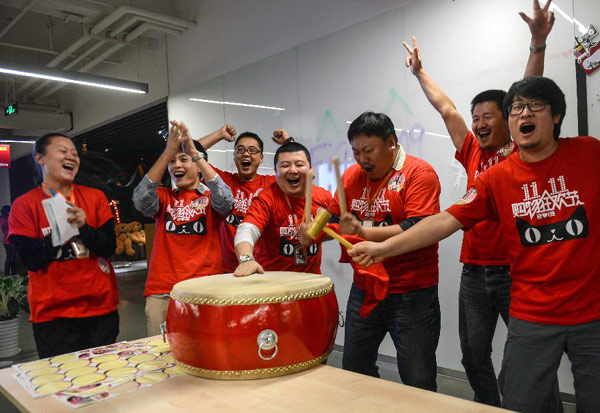
Staff members of Tmall, a business-to-consumer marketplace of China's biggest e-commerce platform Alibaba, cheer for rising order volumes in Hangzhou, capital of East China's Zhejiang province, Nov. 11, 2013. (Photo/Xinhua)
The online shopping sale on Nov 11 has been put in the spotlight with analysts keen to find solid evidence of improving consumer demand that might bolster the slowing economy.
Unfortunately, the prospering e-commerce industry can hardly solve the problems facing the economy on its own.
China's e-commerce giant Alibaba Group Ltd launched the online Singles' Day sale in 2009. Since then, the date, made up of four lonely "ones", has become the world's biggest online shopping event.
The expectations are this year will be another bonanza and set a new sales record, which has ignited hopes that online consumption can at least partially offset the downward pressure on the economy from falling investment and exports.
A closer look at the event, however, shows such hopes are unrealistic.
The soaring sales on Singles' Day are actually a "sales overdraft" that results from the sudden release of consumers' pent up demand. Many people opt not to make planned purchases days or months ahead of Nov 11 hoping to benefit from the promotional discounts offered that day, and sales generally fall sharply after the event.
There is yet no evidence to support the notion that the contrived shopping spree provides a real boost to the country's overall annual consumption.
In reality, for many brands it represents a marketing opportunity rather than a means to significantly increase their annual sales. Some dishonest online retailers even use tricks to avoid offering real discounts in a bid to deceive buyers into thinking they are getting a bargain. For example, they may raise prices in the run-up to Singles' Day before announcing "big discounts" for Nov 11.
However, consumers are becoming more rational and avoiding the impetuous spending that has characterized previous one-day sales specials as they realize such events are only a gimmick to get them to part with their money.
Actually, growth in China's consumer demand has been quite stable in recent years. And with the overall economy weakening, the growth in consumption has been trending down, which is in line with the overall economic trend.
Among the three major factors driving a country's economic growth - domestic consumption, investment and exports, domestic consumption is the most stable. And considering the weak economy, which affects people's confidence in spending, there will hardly be any major improvement in consumer demand despite the hurly-burly of the Nov 11 shopping event.
There is no denying that the convenience of online shopping can stimulate people's desire to buy, but at the same time it squeezes traditional consumer demand, partly offsetting its positive role in economic growth.
For a developing country such as China, the biggest hurdle preventing fast consumption growth is consumer concern about the future because of the country's immature social security network. Many people are worried about their post-retirement life and are very cautious in making purchasing decisions.
Policymakers need to accelerate their pace in improving the social security network and raise people's incomes to stabilize people's expectations for the future and encourage them to spend.
Yet the top priority at the moment is to stabilize the economy. China's infrastructure investment has been growing exceptionally fast in recent months to offset the effect of the falling exports. Against that backdrop, many people have pinned their hopes on faster consumption growth to provide a more sustainable driver of the country's economy.
Indeed, retail sales rose steadily from July to September - from 10.5 percent to 10.9 percent year-on-year, and they are expected to rise further thanks to the Nov 11 event. Still, such small improvements will not suffice to anchor the economy and the Nov 11 sales boom is but a drop in the bucket of required spending.
The author, Xin Zhiming, is a senior writer with China Daily


















































